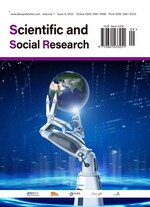Research on the Training Scheme of Innovative Foreign Language Talents in the Era of Artificial Intelligence: Based on Job Market Data from Guangdong
Abstract
The rapid growth of Artificial Intelligence (AI) is fundamentally changing the demand for foreign language skills, displacing traditional professions while also creating new opportunities for individuals with diverse skill sets. Based on human capital theory and a constructivist learning approach, this empirical study analyzes 2,824 job advertisements (2022–2023) from a large recruitment platform in Guangdong, China, to investigate these changing demands and offer an innovative training program. Quantitative content analysis reveals a significant market movement away from pure linguistic competency and toward a model of compound knowledge. According to key findings, high-frequency demands now combine advanced language skills (English first and Japanese second) with technical competencies in programming (Python, Java), AI applications (machine learning, NLP), and industry-specific knowledge (e.g., mechanical engineering, international trade), as well as essential soft skills such as intercultural communication. Explicit mentions of AI-related talents confirm the technology’s penetration into the industry. A large gap exists between these diverse market needs and the output of traditional language-centric systems. In response, the study proposes a unique training structure based on the “Foreign Language + Professions + AI” curriculum. This strategy combines multidisciplinary knowledge, embedded AI literacy, and hands-on project-based learning to develop future-ready professionals capable of prospering in a technologically driven global economy.
References
Chang S, Ding Q, 2024, The Triple Considerations for Cultivating High-level Interdisciplinary Foreign Language Talents from the Perspective of Global Governance: A Concurrent Review of China’s Foreign Language Planning from the Perspective of Global Governance. Contemporary foreign languages studies, 2024(6): 177–183.
Bowker L, 2020, Machine Translation and Global Research: Towards Improved Machine Translation Literacy in the Scholarly Community. Emerald Publishing Limited, Leeds.
Luckin R, 2017, Machine Learning and Human Intelligence: The Future of Education for the 21st Century. UCL Institute of Education Press, London.
Neeley T, 2017, The Language of Global Success: How a Common Tongue Transforms Multinational Organizations. Princeton University Press, New Jersey.
European Commission, 2020, The Future of the Language Industry: The Impact of Automation and Digitalization. Directorate-General for Translation.
Wang L, 2019, Cultivation of Interdisciplinary English Talents in the Era of Artificial Intelligence: A Case Study of the “English + Law” Program. Theory and Practice in Language Studies, 9(12): 1561–1568.
Zhao Y, Lu Y, 2021, Teaching Translation in the Era of Artificial Intelligence: A Case Study of a Computer-aided Translation Course. The Interpreter and Translator Trainer, 15(3): 328–345.
Schultz TW, 1961, Investment in Human Capital. The American Economic Review, 51(1): 1–17.
Becker GS, 1964, Human Capital: A Theoretical and Empirical Analysis, with Special Reference to Education. University of Chicago Press, Chicago.
Piaget J, 1972, The Psychology of the Child. Basic Books, New York City.
Vygotsky LS, (1978). Mind in society: The development of higher psychological processes. Harvard University Press.
Dewey J, 1938, Experience and Education. Macmillan, New York.

